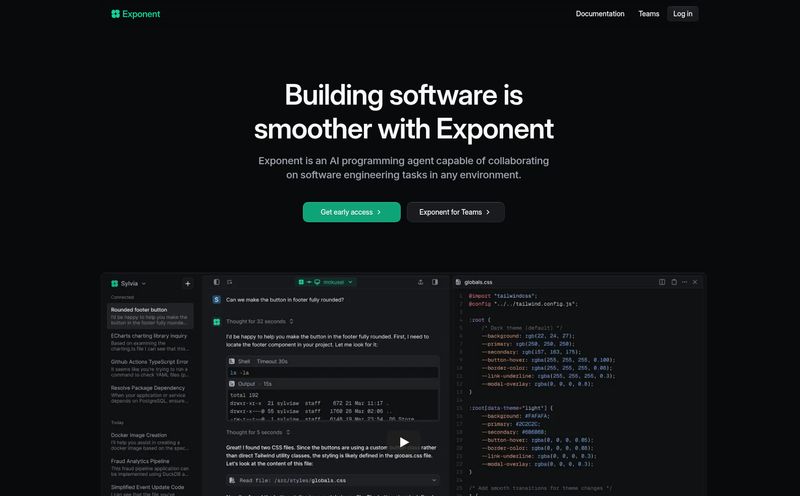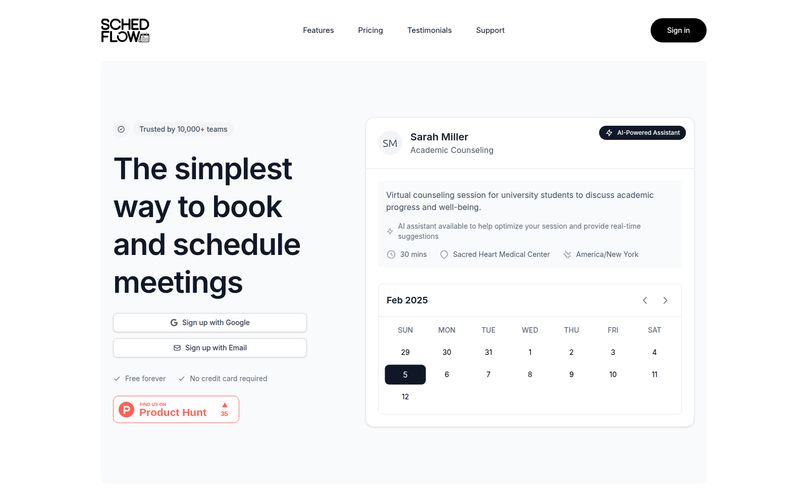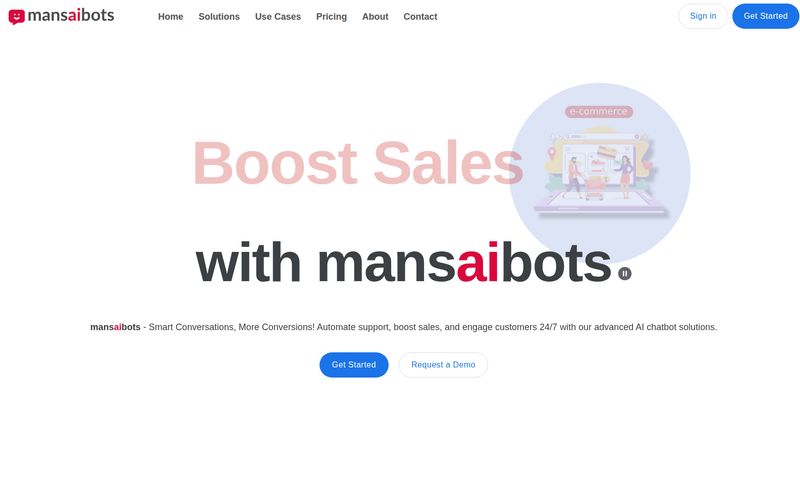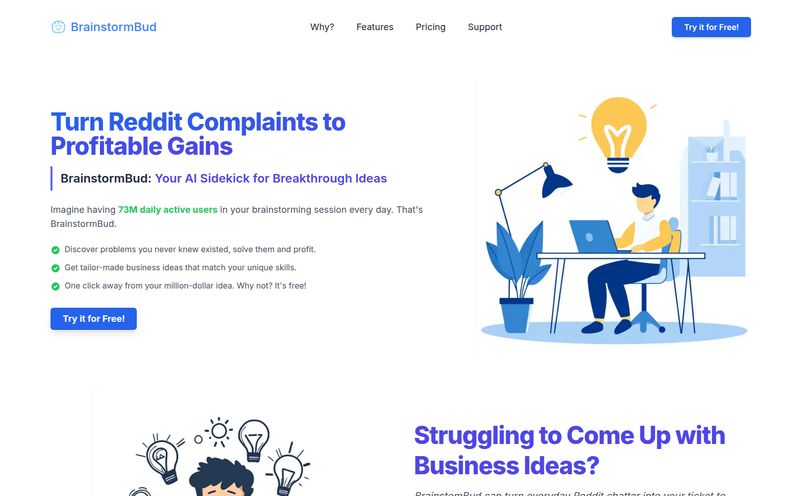The whole 'what do you want to be when you grow up?' question never really goes away, does it? It just gets more complicated. One minute you’re a marketing manager, the next you’re daydreaming about opening a pottery studio. I’ve been in the SEO game for years, and I still have those moments. We’ve all been there, scrolling through job boards at 1 AM, feeling like we’re throwing darts in the dark.
The traditional career advice path is, frankly, a bit worn out. Take a multiple-choice quiz, get sorted into a color-coded box, and receive a list of jobs you probably already thought of. It's been the same for decades. But now, AI is stepping into the ring, and it’s promising something different. I recently stumbled across a platform called yourwAI, and I’ve gotta say, it piqued my interest. It claims to use AI to match your actual personality—not just your answers to canned questions—with your ideal career. A bold claim. So, naturally, I had to see for myself.
What Exactly Is yourwAI?
At its core, yourwAI isn't just another personality quiz. Think of it more as a digital career confidant. Instead of giving you a hundred 'strongly agree' to 'strongly disagree' options, it does something far more interesting: it asks you to write. You describe yourself, your passions, what you're good at, what drives you… in your own words.
This is where the magic is supposed to happen. The platform uses some pretty sophisticated Natural Language Processing (NLP) to analyze what you wrote. It's not just looking for keywords like 'organized' or 'creative.' It's trying to understand the nuance, the sentiment, and the underlying traits that make you, well, you. It’s a move away from the rigid frameworks of tests like the Myers-Briggs and toward something much more fluid and personal.
My First Impressions and How It All Works
Logging into yourwAI is a clean, no-fuss experience. The interface is modern and intuitive, which is a relief. When you're already in a state of career-induced anxiety, the last thing you need is a clunky website. The main event is the 'Test'. You're presented with a simple text box and a prompt to describe yourself.
And I'll admit, I paused. A blank page can be intimidating. But then I started writing. And it felt... good. Cathartic, even. I wasn't trying to game a system or pick the 'right' answer. I was just reflecting. I wrote about my love for digging into data, my frustration with repetitive tasks, and that weird satisfaction I get from explaining a complex topic simply. It felt more like journaling than taking a test.
After you submit your text, the AI gets to work. A few moments later, you get a report that connects your described personality traits to potential career paths. It’s a far cry from the generic feedback I’ve seen from other tools.
">
The Good Stuff That Made Me Nod in Agreement
The best part of the yourwAI experience is the specificity. The report I received didn't just say 'You should work in digital marketing.' It dug deeper, suggesting roles like 'SEO Strategist' (nailed it) but also 'Technical Writer' and 'Data Journalist'. It explained why based on the language I used. It picked up on my analytical side but also my communication style. This level of personalization is something I haven't seen before in an automated tool. It felt less like a computer spitting out data and more like someone had actually listened to me.
The platform is also incredibly user-friendly. From the test to the final report, everything is laid out logically. You dont need to be a tech wizard to use it, which opens it up to a much wider audience of job seekers and career changers.
A Few Things That Might Not Be for Everyone
Now, it's not perfect. Nothing ever is. The very thing I loved—the free-form writing—could be a hurdle for others. If you’re someone who struggles to put thoughts into words or you just want a quick 5-minute quiz, this might feel like homework. The quality of your results is directly tied to the quality and honesty of your input. You have to be willing to do a bit of self-reflection.
I also noticed mentions of a 'Lite' report. This suggests a freemium model, where the initial analysis is free, but the really juicy, in-depth details might be behind a paywall. This is standard practice, but for some, the free report might feel like an appetizer that leaves you hungry for the main course. Which brings up the bigger questions about cost and value.
So, How Does It Compare to Traditional Methods?
For years, people have sworn by tests like the MBTI or the Strong Interest Inventory. And they have their place! But many experts, like those cited in a 2014 Vox article, argue they can be overly simplistic and lack scientific validity. They put you in a box. Are you an INTJ or an ENFP? The labels can be limiting.
yourwAI feels like an evolution. It's dynamic. If you took the test today and again in six months after learning a new skill or discovering a new passion, your results would change because you have changed. Your own words are the source code. This is the difference between a static photograph and a live video feed of your professional potential.
">
Let's Talk About the AI Magic: NLP
So how does it do this? The tech behind it is Natural Language Processing (NLP). In simple terms, NLP is a field of artificial intelligence that gives computers the ability to read, understand, and interpret human language. It's the same technology that powers Siri and Google Translate. In the case of yourwAI, the AI isn't just scanning for keywords. It's analyzing sentence structure, sentiment (the emotional tone of your writing), and the relationships between concepts to build a multidimensional profile of you. It's pretty impressive stuff and a far cry from teh simple algorithms of yesterday.
The Big Question: What's the Price Tag?
Here’s the million-dollar question. Or, hopefully, a lot less. At the time of writing this, I couldn't find clear pricing information on their website. This is a bit of a pet peeve of mine, but not uncommon for new platforms testing the market.
However, let's put it in perspective. A single session with a human career coach can cost anywhere from $100 to $500. If yourwAI's full, detailed report can deliver even a fraction of that value for a lower price, it's a compelling proposition. You're paying for a highly personalized, data-driven starting point for your career exploration. For someone feeling truly lost, that could be priceless.
Is yourwAI Your Next Career Move?
After spending time with yourwAI, I’m genuinely optimistic. It’s not a magic eight-ball that will give you a single, perfect answer. No tool can do that. But it is an incredibly powerful mirror. It reflects your own thoughts back at you, organized and analyzed in a way that reveals patterns you might not have seen yourself.
If you're at a crossroads, feeling stuck, or just curious about what else might be out there for you, I think it's absolutely worth a try. It’s an innovative step forward in career guidance, moving us from rigid boxes to personalized conversations. And in a world of endless options, a little bit of clarity can go a very long way.
">
Frequently Asked Questions
Is yourwAI free to use?
The initial test and a 'Lite' report appear to be free. However, for a more detailed and comprehensive analysis, there is likely a fee. This is a common model for such platforms, offering a free preview to showcase their value.
How is yourwAI different from the Myers-Briggs (MBTI) test?
The main difference is the input method. MBTI uses a multiple-choice questionnaire to sort you into one of 16 personality types. yourwAI uses free-form text and NLP to create a more dynamic and personalized profile based on your own words, rather than fitting you into a pre-defined category.
Who is this tool best for?
It’s ideal for anyone feeling uncertain about their career path—whether you're a student, a recent graduate, or a mid-career professional considering a change. It's particularly useful for those who are self-reflective and willing to put their thoughts into writing.
How long does the test take?
The time it takes is entirely up to you. You could spend 10 minutes writing a few paragraphs or an hour crafting a detailed self-description. Generally, the more thoughtful and detailed your input, the more insightful your results will be.
Is my data private and secure?
Like any online platform, it's crucial to review their privacy policy. Generally, reputable AI companies take data privacy very seriously. yourwAI states it provides a secure platform, but users should always be mindful of the personal information they share online.
What kind of career suggestions does it provide?
The suggestions are quite specific. Instead of broad categories like 'healthcare,' it might suggest roles like 'health informatics specialist' or 'patient advocate,' along with a justification based on the traits it identified in your writing.
Reference and Sources
- Adam Grant on why the Myers-Briggs is 'junk science' - Vox
- The Right Way to Make a Big Career Transition - Harvard Business Review



